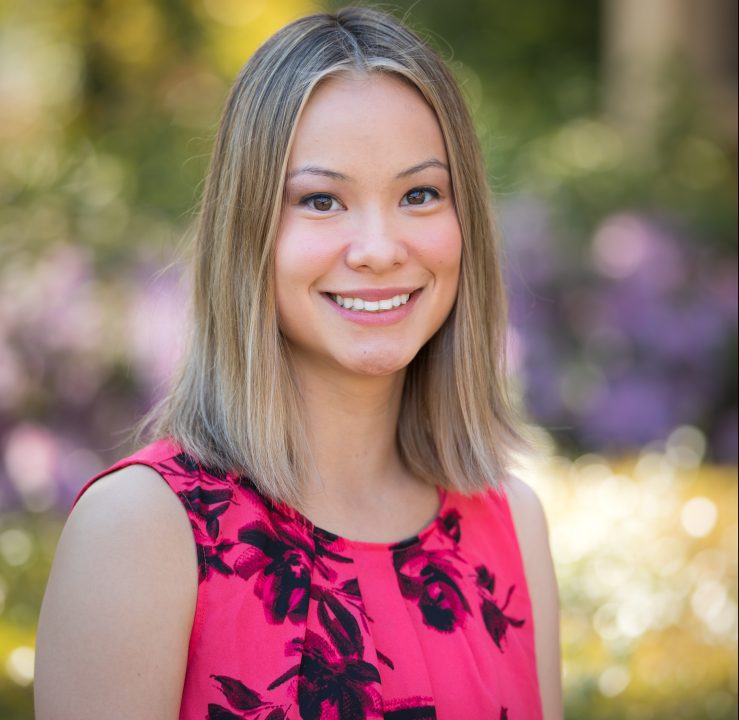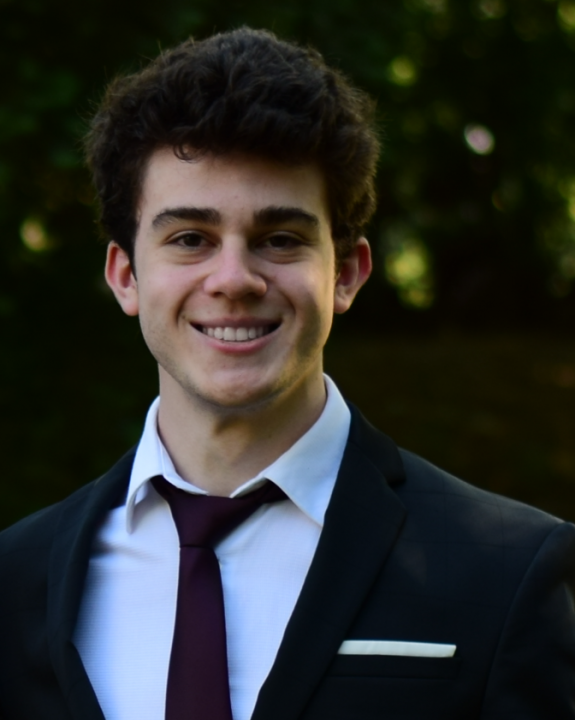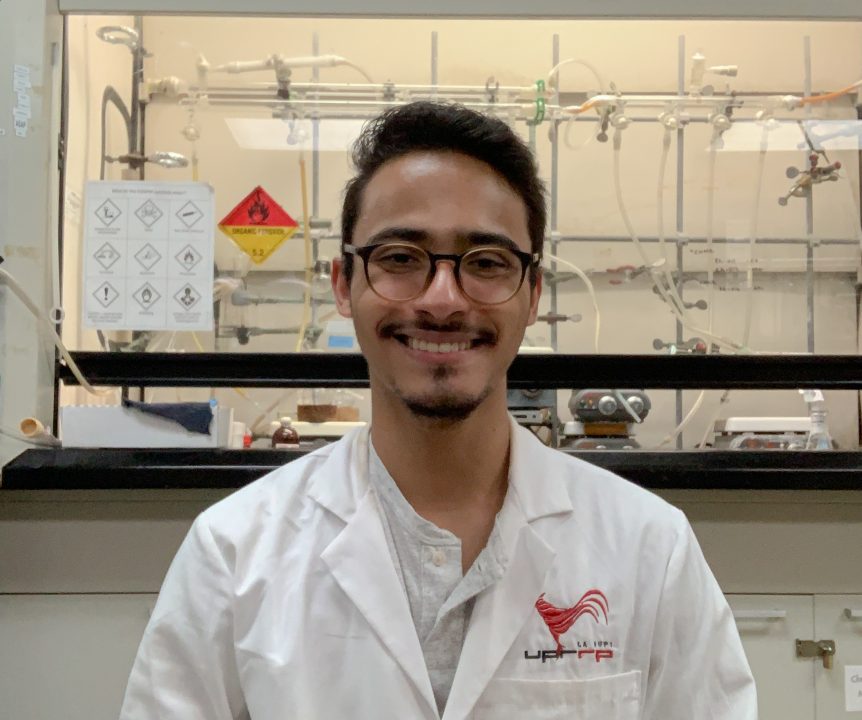Remote Research and Networking in Pandemic Times

For undergraduate Caroline Yuk, the COVID-19 pandemic has been especially tough. As a deaf person, Yuk has had extra challenges navigating mask-wearing and social distancing. And as a recent neurobiology graduate at the University of Alabama, she was looking forward to getting hands-on lab experience this past summer through the Amgen Scholars Program (ASP) at Harvard before it went remote. But there was a bright side: robust virtual programming.
“I was so looking forward to getting into a lab in-person and learning hands-on techniques and actively participating in experiments, but this program was the best virtual experience I could have asked for,” Yuk says of the Harvard ASP experience, which was deferred from the summer of 2020. “While it was tiring to sit in front of a computer all day, my project was very engaging.”
Working in the lab of Lisa Goodrich and with supervisor Austen Sitko, Yuk looked at microscopy images of auditory neurons, made 3-D reconstruction of them with specialized software, and conducted analysis to better understand the function and development of the neurons. Yuk says she met daily with Sitko to discuss papers, experiments, and analysis.
She particularly appreciated when Sitko shared with her some anatomy papers from the 1980s. “Going back to that period and understanding how we have come to understand the anatomy of the auditory brainstem efferents with their methods and rationale was not only enlightening, but it helped things click for me,” she says. “That was a great takeaway for me, as before the program, I would typically only look at very recent papers.”
In addition to the virtual programming through Harvard, Yuk got to participate in the Global Symposium with hundreds of other Amgen Scholars. The virtual event included alumni, biotech professionals, and academics discussing various aspects of the biosciences, from grad school through industry. “It was excellent to have the opportunity to hear from speakers from every sector of biotechnology,” Yuk says.

“I see the Global Symposium as an unbelievably valuable asset that should become a regular part of the Amgen Scholars Program, even after the program starts running on-site again,” says Milan Đorđević, an Amgen Scholar at the University of Cambridge. “To achieve any type of progress, it is always helpful to receive input from someone who already walked in your shoes and Global Symposium provides exactly that – tips and tricks from the past Scholars.”
Like Yuk, Đorđević was also looking to gain hands-on research experience this summer, and was happy to have an opportunity, even remotely. “Since the start of the COVID-19 pandemic, it has been increasingly harder to obtain any research experience because many labs were working with a limited capacity. The travel regulations have been ever-changing, and that uncertainty has affected the feasibility of doing research abroad,” he says. “Through ASP, I was able to take part in the research I am passionate about, at one of the most prestigious universities in the world.”
In addition to the research experience, Đorđević, who is a molecular biology major at the University of Belgrade, was hoping to build out his professional network. “I had grand expectations of people I was going to meet during the program, and indeed, I was incredibly happy to interact with so many ambitious people who are passionate about science,” he says.
Those interactions included meeting various alumni and other Scholars through the Global Symposium. Đorđević pointed to the virtual networking lounge available at the Symposium: “Through this activity, I managed to meet and exchange experiences with a lot of amazing people from all over the globe.”

Becoming part of a community of Scholars was a major goal of René García-Del Valle in participating in ASP this year. A chemistry major at the University of Puerto Rico, Río Piedras, García-Del Valle participated in ASP remotely through the University of Texas, Southwestern (UTSW) Medical Center. He was hoping to get some experience with computational chemistry. “I was really interested in the intersection of computational analysis in order to explain certain reactivities in organic chemistry,” he says. “The advisors in my program trained and guided me through those challenging first steps until I was able to tackle my computational analysis project with confidence.”
As a first-generation college student, García-Del Valle says it was scary to dive into a STEM field. “The impostor syndrome gets in your head,” he says. “But luckily, I found an amazing network of mentors who have helped and supported me along my path.”
García-Del Valle especially enjoyed the research roundtables at the Global Symposium, with Janet Antwi leading a discussion for the organic chemistry table. “It was nice interacting with fellow organic chemists from other Amgen Scholars sites nationwide and worldwide,” he says.
He, Đorđević, and Yuk also all pointed to the talk by Giles Yeo, a researcher at the University of Cambridge, as a highlight of the Global Symposium. “I thought it was extremely informative, entertaining, and significant,” Yuk says. “It inspired me to investigate science communication as a possible avenue or career choice.”
Says Đorđević: “I was astonished by the top-down approach Giles employed in order to identify a few basic principles governing science communication, from which he derived corresponding actions one can undertake to communicate effectively.”
All three Scholars left their summer experiences empowered and inspired to continue their research paths. Yuk, now a graduate student in neuroscience at the University of Oxford on the Marshall Scholarship, says that ASP has given her more confidence. “One of the goals of the program was to have informational interviews with a person in your lab. I ended up having an interview with nearly everyone, and this was the best thing I could have done,” she says. “Not only was I able to better connect with people over a virtual platform, but I learned important advice on mental health, being a minority in STEM, what it is like to be a woman in graduate school, and general life advice.”
“ASP definitely solidified my interest in pursuing graduate studies,” García-Del Valle says, “The professional development and research experience that I gained during my time at UTSW has given me invaluable skills to continue my career in science.”
Đorđević will be applying soon for PhD positions and plans to look for new research opportunities. “The pandemic has hindered every aspect of our lives, but as time progresses, I feel that things are getting better and better,” he says, “and I am looking forward to further enriching my skill set by doing more research in the field.”

